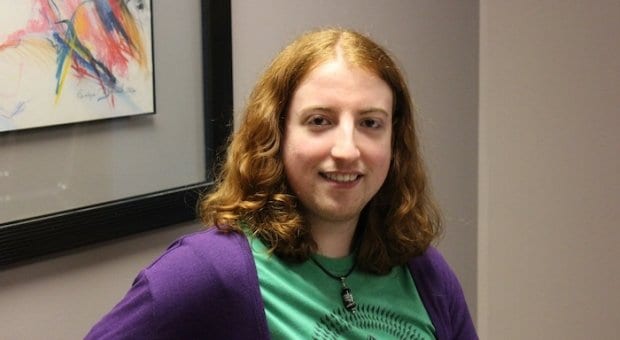Biphobia means facing discrimination from queer community members and heterosexuals alike.
“There’s a polarization thing that can happen in queer communities where it sort of evolves into an ‘us or them,’” says Aryn Ziebarth, who has been PTS’s board secretary since November 2011. “Because the queer community is so other-ed from the rest of society, sometimes you want to push back from that really hard, and some people who identify as bi are seen as not being gay enough in some ways.”
Ziebarth used to facilitate BiAmore, which was a discussion group for bisexual and polyamorous people at the time. PTS still has BiAmore meetings but now also has a separate poly group called Polybilities.
“After my second year of running the group I joined the board because they had nobody at the time who was not a man or a woman or identified that way,” Ziebarth says. “There wasn’t anybody really young on the board either. It was largely 40-plus.”
Since last year’s AGM, PTS’s board includes younger members. Hannah Watt is 18 and Julien Geremie, PTS’s treasurer, is in his 20s. Ziebarth, who identifies as genderqueer and prefers the non-gender-specific pronoun they, feels strongly about the diversity of PTS and its programming. The peer support provided at groups like BiAmore is essential, they say.
“It’s cathartic, it’s healthy, it kind of keeps things from being buried,” they say. “I’ve personally seen a lot of people get a lot of benefit from just being able to talk through issues.”
Peer support for bisexual and pansexual people is particularly important because of the dual discrimination they often experience from queer people and heterosexuals alike, Ziebarth says. Although some progress has been made, bi people still find themselves the target of assumptions and stereotypes, they say.
“With women, it’s dismissed as being a ploy for male attention a lot of the time, and it’s dismissed as just kind of a topical thing, that it’s now popular to be bi as a woman,” they say. “The common theme is always to degrade the identity as illegitimate or a stepping stone.”
While bisexual-identified women are often assumed to be or told to their face that they’re really straight, bi men are often considered gay men who lack the courage or self-awareness to realize that they’re gay, Ziebarth says.
“With men, it’s seen as you’re going to be gay in the next two, three years — this is just a stepping stone to coming out as fully gay,” they say. “I’ve personally experienced a lot of men in particular who either claim to want to convert me to being fully gay or just dismissed me offhand as ‘you’re not gay enough for me.’ That kind of thing definitely still happens.”
BiAmore meetings provide a safe place to talk about experiences and lend support to others, Ziebarth says. They still attend meetings sometimes, but with the time commitment as board secretary, it was good to hand over facilitation of the meetings to others, they say.
As PTS begins another year, things are looking good for the organization, Ziebarth says.
“Funding is always an issue,” they say. “We’re making a lot of big strides in that department. [The past year] has been one of the more successful ones in the last five years or so as far as fundraising goes, and we’re really on track to get some good numbers this year, which is really encouraging.”
Ziebarth is passionate about being a member of the board and serving as secretary.
“It’s really important to me because the organization really was super helpful for me when I was first coming out as bi,” they say. “I really believe in it. I don’t think that I owe a debt to it, but it helped me so much that I want to give back.”


 Why you can trust Xtra
Why you can trust Xtra


